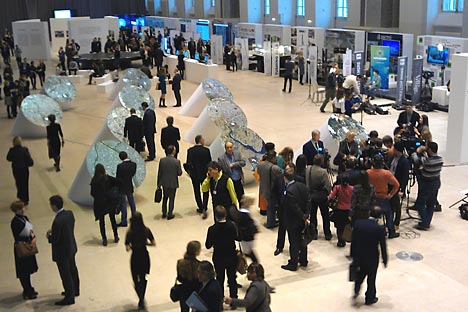
The Third Moscow Urban Forum was held on Dec. 5-7 at the Moscow Manege. Source: Yulia Ponomareva / RBTH
Hundreds of experts in urban planning and architecture shared their views and debated strategies for managing and improving Moscow’s development on Dec. 5 as part of the Moscow Urban Forum.
The three-day forum was attended also by representatives from management companies and city administrations in London, Sao Paulo, Helsinki and other metropolises, with the goal of advising Moscow on ways to improve its investment potential.
The forum began with a discussion of the challenges of urban growth and development of peripheral regions. Arrow, a Moscow institute for media, architecture and design, presented a large study entitled "Archaeology of the Periphery," which compared benchmarks of urban environments, such as the availability of public transport in relation to the size of the periphery and the population density in Moscow, London, Paris, Istanbul, Tokyo, and other capitals.
Project leader Yuri Grigoryan highlighted the main problems that must be solved in order to fully develop Moscow. Among them are the traffic congestion and the lack of transport connectivity in some areas, the degradation of the environment and decline in the quality of life as a consequence of economic imbalances, as well as the threat in some regions of losing their identity.
Roel Spee, the head of advisory services for IBM Plant Location International, presented a report entitled "City Competitiveness from Corporate Perspective." The ratings were based on the relative cost of doing business and the quality and accessibility of the city's infrastructure, in particular the financial and telecommunication services, research and development capacity of cities, the concentration of offices of international companies, and other issues.
Moscow's best results, according to Spee, were in the development of the IT infrastructure -- here it ranked 49 out of the 100 cities the IBM group studied. Moscow scored worse in shared services, where it ranked 76.
“Moscow offers a variety of strengths from an investor perspective," said Spee. "But some elements can be further improved, to become more competitive."
Moscow's key strengths are its strong market opportunity, large pool of experienced staff across different sectors, extensive relevant student pool, good presence of research and development skills, strong academic research base, and favorable tax environment.
Spee said the main areas for improvement are the general business environment (focus on fighting bureaucracy, corruption and achievement of better legal transparency), regulatory (data security, IP protection, entry of foreign visitors and workers), high cost of labor and real estate, R&D alignment to business needs (limited university-industry collaboration), local mobility (congestion), and quality of life improvement (public service, cost of living, safety, pollution).
Moscow Mayor Sergei Sobyanin said in a statement that the city authorities are moving away from the centripetal development of the city to the concept of “polycentricity.” Investments in the city, according to him, have been directed away from infill projects in the city center to develop industrial zones and undeveloped areas.
Sobyanin also spoke about road construction, including the development of main highway arteries and constructing two large links between the railways and subway.
"We have created one of the world's largest transportation programs, the underground subway, which currently does not reach a quarter of Moscow's suburbs," said Sobyanin.
Sobyanin's assistant Alexei Komissarov discussed the revision of the city's investment strategy. "Moscow has started to think about attracting not just any investors, but those who invest in technology," said Komissarov. Priority areas, according to him, are IT, microelectronics and biotechnology.
Moscow city authorities, says Komissarov, are focusing on developing technology clusters in South Port (Moscow technopolis), Zelenograd, and Kolomenskoye. Starting next year, students in their final year of the best engineering schools in Moscow will be given internships in Rostekhnologiya company.
All rights reserved by Rossiyskaya Gazeta.
Subscribe
to our newsletter!
Get the week's best stories straight to your inbox